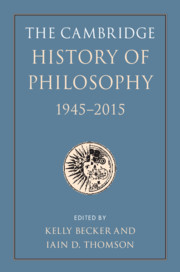Book contents
- The Cambridge History of Philosophy, 1945–2015
- The Cambridge History of Philosophy, 1945–2015
- Copyright page
- Contents
- Contributors
- Preface and Acknowledgments
- Introduction
- Part I Analytic Philosophy
- Section One Language, Mind, Epistemology
- Section Two Logic, Metaphysics, Science
- Section Three Analytic Moral, Social, and Political Philosophy
- 16 The Revival of Virtue Ethics
- 17 Kantian Ethics
- 18 Consequentialism and Its Critics
- 19 The Rediscovery of Metanormativity
- 20 Constitutivism
- 21 John Rawls’s Political Liberalism
- 22 The Twilight of the Liberal Social Contract
- 23 Feminist Philosophy and Real Politics
- Section Four Analytic Aesthetics and Philosophy of Religion
- Part II Continental Philosophy
- Part III Bridge Builders, Border Crossers, Synthesizers, and Comparative Philosophy
- Part IV Epilogue: On the Philosophy of the History of Philosophy
- References
- Index
21 - John Rawls’s Political Liberalism
from Section Three - Analytic Moral, Social, and Political Philosophy
Published online by Cambridge University Press: 08 November 2019
- The Cambridge History of Philosophy, 1945–2015
- The Cambridge History of Philosophy, 1945–2015
- Copyright page
- Contents
- Contributors
- Preface and Acknowledgments
- Introduction
- Part I Analytic Philosophy
- Section One Language, Mind, Epistemology
- Section Two Logic, Metaphysics, Science
- Section Three Analytic Moral, Social, and Political Philosophy
- 16 The Revival of Virtue Ethics
- 17 Kantian Ethics
- 18 Consequentialism and Its Critics
- 19 The Rediscovery of Metanormativity
- 20 Constitutivism
- 21 John Rawls’s Political Liberalism
- 22 The Twilight of the Liberal Social Contract
- 23 Feminist Philosophy and Real Politics
- Section Four Analytic Aesthetics and Philosophy of Religion
- Part II Continental Philosophy
- Part III Bridge Builders, Border Crossers, Synthesizers, and Comparative Philosophy
- Part IV Epilogue: On the Philosophy of the History of Philosophy
- References
- Index
Summary
John Rawls’s A Theory of Justice is generally recognized as the greatest work of political philosophy in the twentieth century; his Political Liberalism may well be the most revolutionary.1 PL has set the agenda for much of political philosophy in the twenty-first century. As we shall emphasize, Rawls’s political liberalism was not simply a new approach to political theory, but part of a wider rethinking of the relation of moral and social theory, and of the place of diversity in moral thinking. Rawls developed PL in response to his increasing appreciation of the depth of disagreement among reasonable people and the complexities of formulating a moral theory appropriate for societies with such diversity.
- Type
- Chapter
- Information
- The Cambridge History of Philosophy, 1945–2015 , pp. 287 - 296Publisher: Cambridge University PressPrint publication year: 2019

